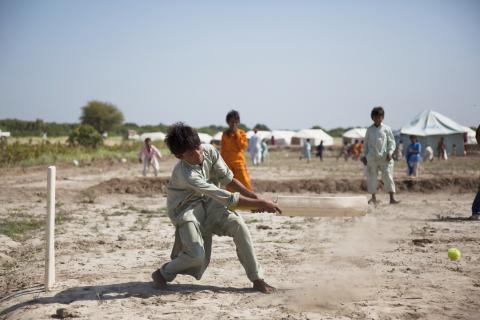You are in this section
International guidelines for safer sport launched
International Inspiration (IN) is proud to announce the release of the first international safeguards for children in sport to ensure that sport programmes are delivered in an environment where children can play and feel safe.
Working alongside governments, funders, donors, international federations, national bodies and organisations delivering sports programmes across the world, IN has supported the research behind the safeguards that have been designed as part of a global effort to ensure the safety of children and achieve the critical objective 'To advocate for the right of children and young people to play and participate in sport and physical activity in a safe and inclusive environment'.
Overall the Safeguards aim to:
- Help create a safe sporting environment for children wherever they participate and at whatever level
- Provide guidance to sports providers so they can ensure organisations they work with know how to protect children
- Promote good practice to sporting organisations to follow and challenge practice that is harmful to children
- Provide clarity on safeguarding children so all those involved in sport know how to keep children safe
The guidelines were launched by Amanda Dlamini, South Africa National Soccer Player, at the Beyond Sport Summit in South Africa last week and have been endorsed by leading figures in sport, including Chairman of IN Lord Coe, British Paralympian swimmer Ellie Simmonds OBE and Mozambican footballer Tico Tico.
Coe comments: “The Rights of the Child should be at the heart of everything we do. At every level of sport, everyone has a responsibility to ensure that children are free to express themselves in an environment that is safe from harm. International Inspiration, in partnership with leading organisations and federations, has developed these guidelines to ensure that this happens. They are standards that we and our partners are implementing to ensure that the millions of children around the world have access to high quality, inclusive and ultimately safe sport.”
Tico Tico, the founder of the Tico Tico School Association, which works in partnership with IN said: "As an international footballer and founder of a grassroots soccer school in Mozambique, I’ve witnessed first-hand just how powerful sport can be in transforming children’s lives. Children can only excel through sport if they play in a safe and inclusive environment. The implementation of these safeguards will ensure that many more children around the world will be inspired by sport and protected from harm."
Poonam Sattee, Head of Programme Development at IN, believes the guidelines are crucial step forward. She said: "IN works in partnership with grassroots organisations around the world and so it is critical that all our partners are aware of their responsibility to the children we aim to empower. These are not just guidelines but expectations."
Millions of children and young people take part in sporting activities every day across the world. For some children this is purely for recreation, for others a chosen career and for some a path out of poverty. But it is increasingly recognised that too often children taking part in sporting activities are not properly protected from harm, leading to incidences of abuse and harm.
The founder members of the International Safeguarding and Sport working group are: International Inspiration (IN), Beyond Sport, Caribbean Sport and Development Agency, Comic Relief, Child Protection in Sport Unit (NSPCC), Commonwealth Secretariat, Keeping Children Safe, Swiss Academy for Development/sportanddev.org, Right to Play, UK Sport, UNICEF UK and Women Win.
Brunel University were responsible for coordinating the finalisation of the safeguards. The safeguards were trialled by 40 organisations around the world ranging from international federations to sport and development organisations.
The eight safeguards are: Developing a policy, procedures for responding to safeguarding concerns, advice and support, minimising risks to children, guidelines for behaviour, recruiting, training and communicating, working with partners and monitoring and evaluating.
It is with the support of the OAK Foundation that this critical research has been made possible.
Further information can be found here.

